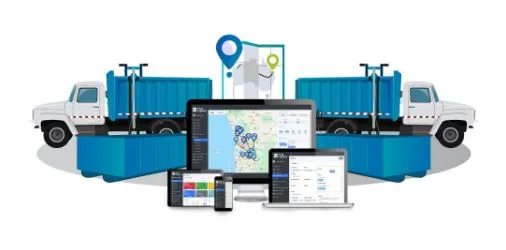The Future of Skip Bin Services: Smart Waste Software Management
The skip bin business is no longer just about renting bins and driving them away. Over the past decade, the industry has quietly stitched itself into the digital age, and the centerpiece is waste management software. As cities swell, environmental laws tighten, and customers demand speed, tech-driven solutions have shifted from being optional perks to essential tools.
The Rise of Waste Management Software in Skip Bin Services
Not long ago, companies operated with notebooks, sticky notes, and over-crowded call centers. Drivers jotted down pickup times, operators relied on memory to double-book routes, and invoices went out with surprising added fees. Reports surfaced days later if at all. Daily headaches went unsolved.
Now, intelligent software is rewriting the script. Phones and tablets carry the central dashboard. A few clicks schedule the bin, assign the closest available truck, and notify the driver with turn-by-turn directions. Sensors in the bins monitor fill levels, alerting the team only when a collection is necessary. Ghosted trips vanish. Billing is tied to exact dates and routes. The software crunches the data and if fuel, driver hours, or pricing patterns worsen, flags pop up in the manager’s dashboard. Streamlined operations, instant insights, and eliminated guesswork—these aren’t just upgrades anymore; they’re the fundamental infrastructure of a successful skip bin operation.
In conversations with skip bin operators, it’s clear just how much software has changed the game. Take one firm that once had dispatchers mapping out driver schedules with pencil and paper. Today, the software plans the routes, considering traffic and bin locations in one click. Not only do they spend minutes instead of hours coordinating, but the planned routes also use less fuel, which the customers notice, too. Happier clients and lower fuel bills in one strike show how meaningful software investment can be.
How Smart Software Transforms Skip Bin Operations
The right waste management software gives skip bin firms the tools to track every bin, every schedule, and every load. Customers skip the phone call by booking bin rentals online, while the operator keeps an eye on what’s in stock, when drivers can depart, and which invoice to send—all in the same screen.
Yet the most eye-opening savings come from good route planning. A mapping engine calculates the fastest, greenest route—no more drivers choosing shortcuts that waste gas and time. Live GPS beacons update the office when a bin arrives and when it’s picked up, so jobs finish on schedule. With on-time service, customers call back instead of looking elsewhere.
Smart reporting adds another layer of value for business owners. With just a few clicks, they can see how many bins are on the street, how much material is being recycled, and how it all stacks up against local regulations. That level of detail doesn’t just help a company check boxes on compliance forms; it also shows modern customers that the brand cares about the planet—something buyers are paying close attention to these days.
Environmental Perks of Going Digital with Waste Management
As the global talk about sustainability heats up, waste management companies are in the spotlight more than ever. Smart tracking software cuts back on unnecessary pickup trips, slashes fuel use, and makes recycling more efficient. Take skip bin firms that tag each bin with a GPS-enabled sensor. By doing that, they can quickly sort out recyclables back at the depot and keep tidy reports that show how much waste gets diverted from the landfill.
From what I’ve seen, companies that roll out these systems can easily share clear recycling figures with their customers. When a brand can back up sustainability stories with hard numbers—showing, say, that they diverted 75% of landfill material—the credibility skyrockets. Several of my clients tell me that this transparency has not only boosted their reputation but also helped them snag new business. By positioning themselves as go-to sustainability partners, they’ve turned compliance into a competitive edge.
The Future: AI and IoT in Waste Management
Waste management software is about to take another giant leap thanks to the pairing of Artificial Intelligence (AI) and the Internet of Things (IoT). Picture smart sensors that sit in each bin and track how full they are at any given moment. Rather than sending trucks out on a fixed schedule to collect bins that are often only half full, the trucks arrive only when a bin is actually at capacity. AI, meanwhile, looks at long-term trends to forecast how much waste, when and where, and adjusts collection routes on the fly to cut out any wasted miles.
Cities around the world that are already testing these tools are reporting significant drops in fuel costs and fewer emissions. The smart data lets waste managers scale collections based on real needs, keeping trucks off the road when they’re not required. For skip bin services, deploying these technologies is not a futuristic luxury any longer: it’s a competitive advantage that’s almost ready to graduate from pilot to scale.
Why Skip Bin Companies Should Invest Now
- Skip bin operators who put off these software solutions risk watching job orders drift to quicker, savvier rivals. Customers of all kinds have gotten used to clicking, tracking, and seeing their costs in real time, and they will not wait around for operators who force them into old-school phone calls and opaque invoices. If companies keep to back-office bookings and basic tracking, they’ll lose present contracts as quickly as future ones. The cost of the technology continues to drop, while the competitive advantage of adopting it will only keep getting wider. Play catch-up tomorrow, and scale challenges will outweigh every savings the urgency was supposed to deliver today.
- Take it one step at a time. A simple solution that automates your scheduling and invoicing is a great place to begin. These functions can save hours each week in busy offices, boosting accuracy and freeing staff to focus on service. After a few months, your customers and workers will have a feel for digital workflows—then you can layer on the cool stuff, like route optimization to use less fuel, sensor-linked bins that signal for pickup at the right time, and predictive reports that forecast demand spikes.
- The skip bin industry is headed for a future that is mostly software, and waste management platforms will drive the gear. These programs cut waste, trim costs, and support green practices. From the telematics boosted routes to the live invoicing portals, my own observations have confirmed that moving to a digital core probably drums up confidence with customers, since the less time is wasted, the more you can predict the right outcome.
- Buying ins and outs of the software is one task, but of the game, it’s keeping pace with sensors and artificial intelligence. Operators who grab the programs now will create lead status that is less a gimmick and more a trusted seal of accountability. Services that now think of smart waste management as an expense will one day see it as the fuel that keeps a sustainable future. Investing in smart waste management software today is lining up with a greener tomorrow.
Conclusion
The future of skip bin services is undeniably digital, and waste management software is at the heart of this transformation. By reducing inefficiencies, lowering costs, and supporting sustainable practices, smart waste solutions are redefining the industry. From my own professional experience, I have seen firsthand how adopting these tools not only streamlines business operations but also builds stronger trust with customers.
As AI and IoT continue to expand the possibilities, the companies that act now will set themselves apart as leaders in innovation and environmental responsibility. Skip bin services that embrace smart waste software management are not just investing in technology they are investing in the future of sustainable business.




